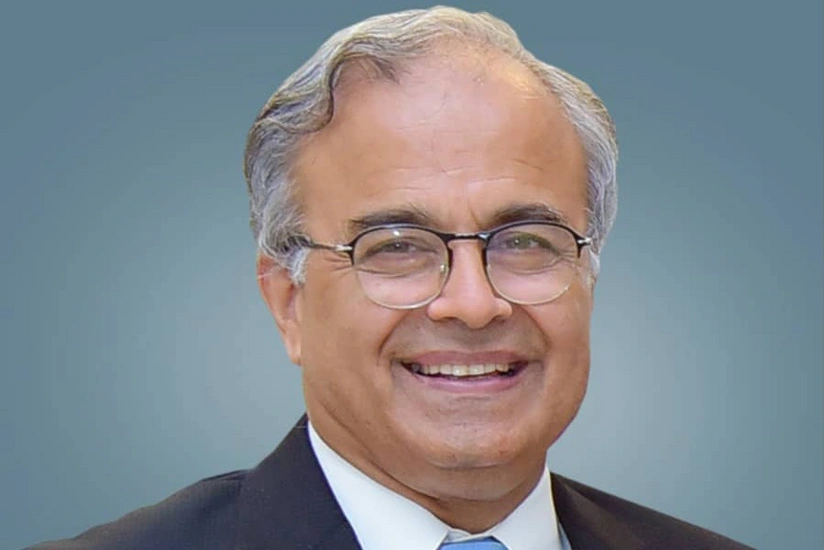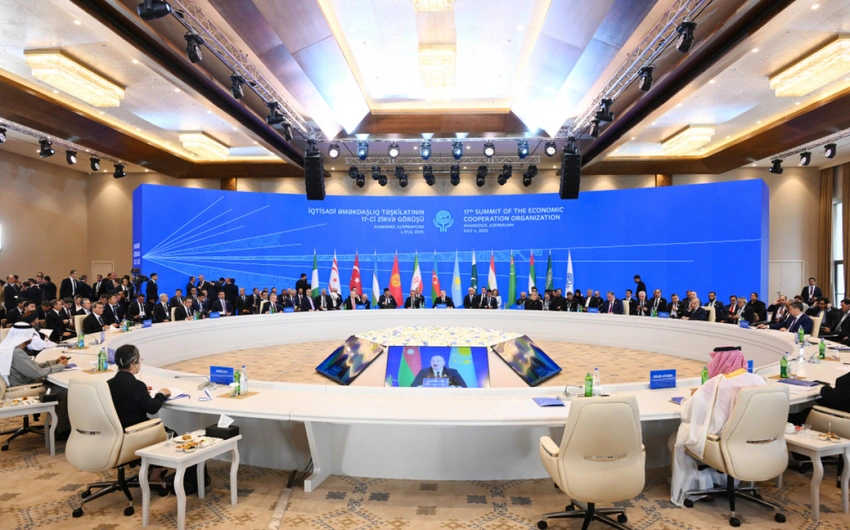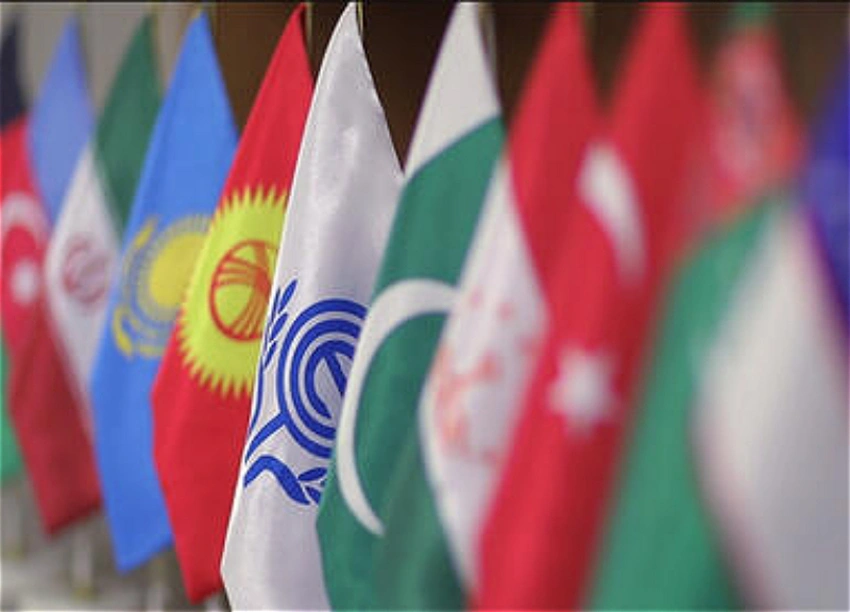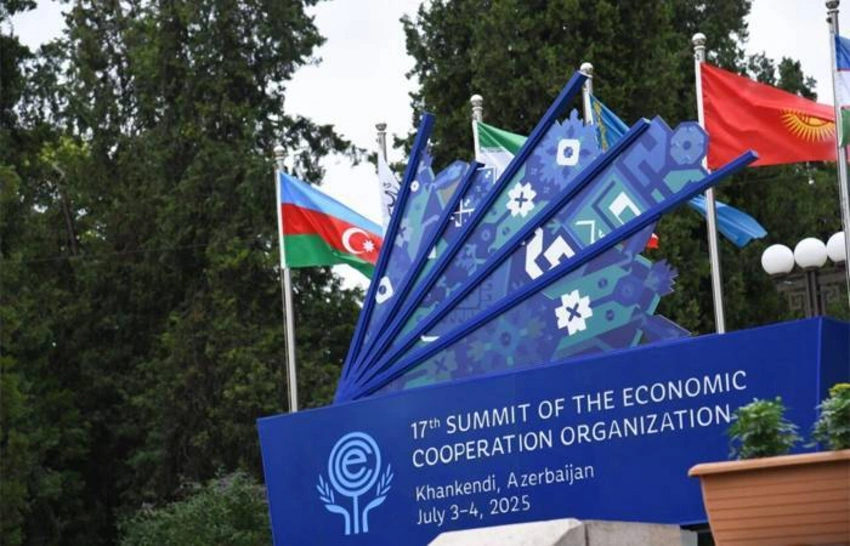Asad M. Khan: Establishment of Clean Energy Center in Baku to pave way for ECO countries to achieve real energy transition - INTERVIEW
- 05 November, 2025
- 12:11

The Economic Cooperation Organization (ECO), which unites 10 Eurasian countries, is actively strengthening regional cooperation. Digitalization, the development of transport corridors, energy transition, and climate change are at the forefront of the agenda.
In an exclusive interview with Report, ECO Secretary General Dr. Asad M. Khan discussed Azerbaijan's role as a strategic partner, the future of the ECO-UNIDO Clean Energy Center in Baku, and plans to develop a unified energy strategy and a digital customs agency. Particular attention was paid to the key challenges facing countries in the region and the opportunities offered by deeper cooperation.
Report presents the interview:
- How do you assess Azerbaijan's role within the ECO, given its strategic position between the Caspian Sea, the Caucasus, and Central Asia? What priority initiatives and projects with Azerbaijan could be implemented in the coming years?
- Azerbaijan plays a strategic and proactive role within ECO, leveraging its location between the Caspian Sea, the Caucasus and Central Asia to advance regional cooperation in climate, energy, agriculture and industry. It has demonstrated leadership through its ECO chairmanship, hosting of COP29 and convening the 17th ECO Summit, promoting green energy, climate resilience and sustainable connectivity.
Azerbaijan's key initiatives include hosting the ECO Clean Energy Center, which will support renewable energy and energy efficiency markets, and co-developing the RESCUE initiative for resource efficiency and the circular economy. In agriculture and industry, Azerbaijan has hosted multiple ECO ministerial meetings and ECO-VECO events, contributing to food security, veterinary health and sustainable trade. Its future engagement in ECO-RISCAM will further strengthen regional standards and facilitate trade. It is further notable that Azerbaijan hosts the ECO Economic Research Center, which at the same time publishes the ECO Economic Journal on economic matters related to our region.
By continuing to lead in these areas and operationalizing its projects, Azerbaijan is positioned to drive sustainable development and regional integration within ECO, while navigating geopolitical complexities and strengthening institutional mechanisms.
- In the context of growing geo-economic competition, the development of transport corridors, including the Middle Corridor and North-South, is gaining special importance. What steps is ECO taking to support these initiatives and coordinate the efforts of member states? Are joint investments or financial mechanisms being considered to accelerate their development?
- In the context of growing geo-economic competition, developing transport corridors like the Middle Corridor and North-South Corridor is critical for regional trade and connectivity. ECO is actively supporting these initiatives by facilitating coordination among member states, promoting harmonized regulations, and providing a platform for dialogue on corridor development and transit facilitation.

Practical steps include aligning infrastructure standards, organizing technical and expert-level meetings, and supporting pilot projects to enhance efficiency along key routes. ECO is also exploring joint investment and financial mechanisms, including pooled funds, public-private partnerships, and engagement with development banks, to accelerate corridor construction and modernization.
By combining policy coordination, technical cooperation, and potential joint financing, ECO aims to make these corridors more competitive, reliable, and sustainable, strengthening trade integration and economic resilience for its member states.
- What, in your opinion, are the key challenges and opportunities for ECO in the coming years? In which areas could the organization strengthen its role as a regional platform for economic integration and sustainable development?
- The ECO region faces environmental, technological, and socio-economic challenges, including climate risks, resource scarcity, uneven technological adoption, and varying levels of engagement among member states. At the same time, it offers significant opportunities for sustainable transformation, economic integration and regional resilience.
Building on the achievements of ECO Vision 2025, ECO can strengthen its role by promoting green energy, climate-smart agriculture, advanced technologies like AI and ICT and digital infrastructure across member states. Initiatives such as the ECO Clean Energy Center (CECECO), RESCUE, ECO-REM, ECO-RISCAM and ECO-VECO exemplify the potential for regional cooperation in energy, environment, agriculture and industrial standards. Tourism, particularly with Azerbaijan's leadership and Shusha as ECO Tourism Capital 2026, provides another avenue to enhance heritage-based, cross-border, and digital tourism initiatives.
Success will depend on enhanced member state engagement, cross-sectoral collaboration, resource mobilization and structured implementation mechanisms. By leveraging these opportunities, ECO can serve as a catalyst for innovation, sustainable development and shared economic growth across the region.
- How do you assess Iran's initiative to establish a Regional Center for Artificial Intelligence within the ECO framework? Which AI directions could become priorities for the region (transport, energy, agriculture, public services)? What steps are being taken or planned for the practical implementation of the initiative? To what extent, in your opinion, are member states ready to coordinate their efforts in the field of digital technologies and artificial intelligence?
- At the 17th ECO Summit held in Khankandi on July 3-4, 2025, Iran's President proposed creating a Regional Center for Artificial Intelligence under the ECO framework. I view this as a timely and strategic idea, since it aligns with ECO's vision of strengthening digital infrastructure and regional cooperation.
In terms of priorities, AI could make the biggest impact in four areas: agriculture - with precision farming and drought forecasting; transport and logistics-through corridor management and customs automation; energy-for grid efficiency and renewable integration; and public services - such as digital health and e-government. For implementation, the most practical path is to start small: form a steering group, conduct a feasibility study, and launch pilot projects in high-impact sectors. ECO's existing institutions, like the Science Foundation and university networks, can support training and knowledge-sharing.

As for readiness, some member states-Türkiye, Iran, Pakistan, and several Central Asian countries-already have AI or digital strategies, while others are at earlier stages. Political and technical differences exist, but if the initiative begins with capacity building and practical pilots, there is a realistic path toward deeper cooperation.
- One of the key challenges for landlocked countries remains access to international trade routes. What role can ECO play in providing more efficient access for such countries to seaports, including the introduction of preferential tariffs and transit facilitation? Are there successful examples of regional transit cooperation to build upon? What are the main challenges in coordinating logistics and tariff solutions with ECO member port countries?
- Access to international trade routes is a defining challenge for ECO, as seven out of ten member states are landlocked. ECO plays a crucial role in addressing this by promoting preferential transit tariffs, advancing digital customs and logistics platforms, and strengthening multimodal corridors linking landlocked members to the ports of Iran, Pakistan and Türkiye. Successful examples include the Istanbul–Tehran–Islamabad railway, the Kazakhstan–Turkmenistan–Iran rail link, and the ECO Transit Transport Framework Agreement, demonstrating that regional coordination can deliver tangible trade and transport connectivity.
Challenges remain, including divergent tariff regimes, uneven infrastructure, and differing levels of industrialization. ECO mitigates these by serving as a neutral facilitator, making endeavors to promote harmonization through initiatives such as the ECO Trade Agreement (ECOTA), Trade Facilitation Strategy and appointment of national transit coordinators. These measures are aimed at ensuring freedom of transit, minimize non-tariff barriers and support smoother cross-border trade.

Looking ahead, ECO is focused on digitalizing freight, customs and logistics corridors, fully implementing the TIR system, enhancing transport infrastructure and fostering regional collaboration to diversify exports and attract investment. By leveraging these tools, ECO can significantly improve access to seaports for its landlocked members, boosting regional trade, competitiveness and economic integration.
- Given the global climate agenda, how do you assess the prospect of creating low-carbon transport and energy corridors within the ECO framework? Are pilot projects already being implemented in this direction? What steps are being taken to form an organization-wide carbon market platform and to what extent can this tool become a driver for sustainable development in the region? Are ECO countries ready to coordinate policies in the field of climate change adaptation and increasing resilience to natural disasters?
- The ECO region has significant potential to develop low-carbon transport and energy corridors, leveraging its strategic trade routes and vast renewable energy resources. The ongoing ECO Transport Strategy (2026–2035) and pilot initiatives, such as the Kazakhstan–Turkmenistan–Iran railway and green freight corridors, demonstrate how sustainability can be integrated into regional connectivity. In the energy sector, plans for long-term green energy corridors and power interconnectors, alongside the upcoming ECO Clean Energy Center (CECECO) in Baku, aim to support renewable integration, energy efficiency and industrial decarbonization.
Steps toward an ECO-wide carbon market are emerging, which could incentivize green investments and cost-effective emissions reductions, becoming a powerful tool for sustainable development. While ECO members have taken national-level actions on climate adaptation and disaster resilience, regional coordination remains uneven due to differences in capacity, financing and governance. ECO's role as a facilitator and knowledge-sharing platform is critical to align policies, scale pilots and build integrated frameworks that strengthen resilience and accelerate the region's low-carbon transition.
- What specific activities and projects will be implemented in the framework of the ECO- Clean Energy Center based in Baku? How will the practical implementation be ensured, especially in countries with limited access to modern renewable energy technologies? Is targeted technical support planned for member countries through this Center?
- The ECO-UNIDO Clean Energy Center (CECECO) in Baku, with its Charter now in force since August 26, 2025, is designed as a pivotal hub to accelerate the region's sustainable energy transition. The Center will focus on scaling up low-carbon and climate-resilient energy infrastructure, promoting higher value-added manufacturing and services, and facilitating south-south knowledge and technology transfer through the Global Network of Regional Sustainable Energy Centers (GN-SEC).
CECECO's practical implementation will rely on targeted projects and work programs based on global best practices, adapted to the needs of ECO member states. Countries with limited access to modern renewable energy technologies will benefit from technical assistance, capacity building and accessible financing, ensuring practical adoption. By mobilizing investment at scale and coordinating with international partners, the Center aims to create a vibrant regional clean energy market and drive sustainable industrial growth across the ECO region.
- One of the expected initiatives is the creation of an ECO Digital Transport and Customs Authority. What are the key objectives of this project and its functions? At what stage is the work on implementing the initiative, and which member states show the greatest interest?
- At the 17th ECO Summit, the President of Uzbekistan proposed the creation of an ECO Digital Transport and Customs Authority. The main objectives of this initiative are to streamline cross-border transport, harmonize customs procedures, and enable a digital, paperless workflow across ECO member states. By providing a centralized digital platform, it aims to reduce delays, lower transaction costs, and improve transparency for traders and logistics operators.

Currently, ECO is working closely with the Uzbek side to organize an expert-level meeting to discuss the operational and technical details of the proposal. This will include defining governance, data-sharing protocols, and integration with existing transit corridors.
Overall, this project has the potential to become a cornerstone for the digitalization of ECO transit and trade, complementing ongoing efforts under the new Transport Strategy 2026–2035 and other corridor development projects
- Do you consider the development of a unified energy strategy for ECO countries to be an urgent task? What key elements might it include: market synchronization, joint investments, and infrastructure projects? What mechanisms are used to coordinate the positions of countries with different energy interests - exporters and importers?
- The development of a unified energy strategy for ECO countries is already underway. The "ECO Strategy for Energy Cooperation 2030", approved at the 4th ECO Energy Ministerial Meeting in June 2021, provides a clear framework for regional collaboration, focusing on sustainable energy transition, regional electricity markets, energy security and investment promotion.
Key elements of the strategy include market synchronization, joint investments and infrastructure development, while ensuring that national priorities are aligned with regional objectives. Coordination among countries with different energy interests, exporters and importers, is achieved through regular ministerial and expert-level dialogues, joint stocktaking of ongoing projects and integration of the strategy's elements into national development plans. The success of this framework depends on the commitment of member states to proactively leverage the strategy, address gaps and explore opportunities for tailored regional cooperation.

- Recently, Uzbekistan proposed to hold a meeting of trade ministers of ECO member countries in Tashkent. Has this proposal been accepted? If yes, when is the meeting planned, and what key issues are expected to be discussed?
- The ECO Secretariat welcomes Uzbekistan's proposal, made during the 17th ECO Summit, to host the ECO Trade Ministers' Meeting in Tashkent in 2025. Türkiye had previously offered to host the 5th ECO Ministerial Meeting on Commerce and Foreign Trade on June 25, 2025, in Istanbul. In light of evolving regional security considerations, the meeting was rescheduled and is now planned for November 26, 2025, in Istanbul. We are confident that the Member States will take up the Uzbek offer and agree to host the new Ministerial Meeting in Uzbekistan.
